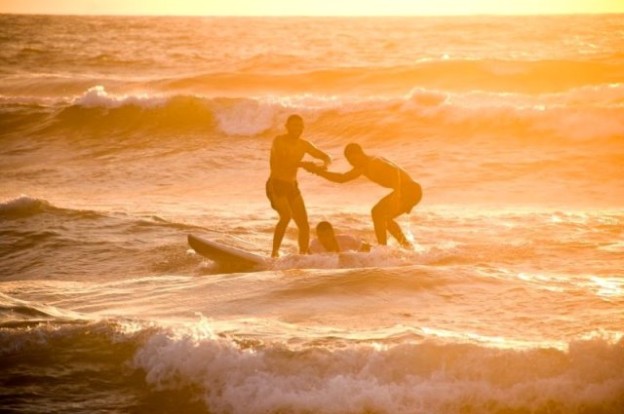
Surfer Pour La Paix
Surfing 4 Peace believes that if people can surf together they can also live together. Born out of a small surf contest in Israel in 2004, Surfing 4 Peace has grown into a multifaceted organization that strives to break down cultural and political enmity with surfing. In 2007 the group hosted a Surfing 4 Peace Concert in Tel Aviv to draw international attention to the role surfing could play in improving relations between Israelis and Palestinians. The concert drew a crowd of thousands and established S4P as a partner dedicated to enduring change.
 Since then S4P has helped to establish ‘Longboarding 4 Peace’ which applies the S4P principles to longboarding – a sport similar to skateboarding in which skaters perform jumps and tricks on a longer board. In 2010 S4P established The Gaza Surfer Girl Project to help female surfers navigate the cultural limitations that might restrict their access to the sport – including designer swimwear that conforms to Islamic law. Earlier this year S4P staged ‘MedCup 4 Peace’, a combination surfing tournament and arts festival that hosted competitors from each Mediterranean country, in the spirit of competition and with the lofty goal of peace.
Since then S4P has helped to establish ‘Longboarding 4 Peace’ which applies the S4P principles to longboarding – a sport similar to skateboarding in which skaters perform jumps and tricks on a longer board. In 2010 S4P established The Gaza Surfer Girl Project to help female surfers navigate the cultural limitations that might restrict their access to the sport – including designer swimwear that conforms to Islamic law. Earlier this year S4P staged ‘MedCup 4 Peace’, a combination surfing tournament and arts festival that hosted competitors from each Mediterranean country, in the spirit of competition and with the lofty goal of peace.
In 2014 Surfing 4 Peace sponsored 22 surfers from 8 Mediterranean countries to participate in the first Suring 4 Peace Summit. The diverse group travelled across southern France from Marseille to Biarritz, training and documenting their journey together. Though the ultimate goal of S4P is institutional change in government, many participants simply enjoyed the opportunity to spend time with other surfers from around the world. “When you surf, it’s like beyond the war or the hate,” says David, a 17 year old Israeli. “You can surf and, like, forget all this.”
Samuel Jacquesson, founder and president of Surfer Pour la Paix, the European branch of Surfing 4 Peace, is the first to admit that surfing alone won’t bring peace. Yet he does believe that the common love of a sport like surfing is enough to start a conversation that will bring people together and can eventually lead to meaningful change in places like the Middle East. “When we meet on common ground,” he says,“we can share something together. It doesn’t mean we agree on everything, or that we have the same opinions. But we do share something together and that’s a start.”
by Ben Young